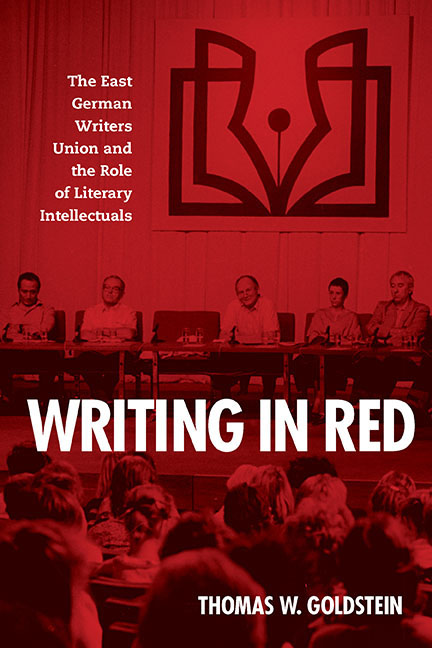Book contents
- Frontmatter
- Contents
- Acknowledgments
- List of Abbreviations
- Introduction
- 1 German Writers Associations through 1970
- 2 Socioeconomic Functions
- 3 The Era of No Taboos? 1971–76
- 4 A Disciplining Instrument, 1976–79
- 5 Defending Peace, Defining Participation, 1979–83
- 6 Years of Resignation, 1983–85
- 7 Glasnost in the GDR? 1985–89
- 8 Coming Full Circle, 1989–90
- Conclusion
- Notes
- Bibliography
- Index
6 - Years of Resignation, 1983–85
Published online by Cambridge University Press: 24 August 2019
- Frontmatter
- Contents
- Acknowledgments
- List of Abbreviations
- Introduction
- 1 German Writers Associations through 1970
- 2 Socioeconomic Functions
- 3 The Era of No Taboos? 1971–76
- 4 A Disciplining Instrument, 1976–79
- 5 Defending Peace, Defining Participation, 1979–83
- 6 Years of Resignation, 1983–85
- 7 Glasnost in the GDR? 1985–89
- 8 Coming Full Circle, 1989–90
- Conclusion
- Notes
- Bibliography
- Index
Summary
IN DECEMBER 1984, HERMANN KANT ANNOUNCED he was taking a leave of absence as president. The reason—a health crisis—seemed plausible enough as Kant had endured persistent medical problems since taking over in 1978. News of his decision was soon made public, as was the appointment of Gerhard Holtz-Baumert as acting president. Six months later Kant resumed his post, holding it until after the fall of the Berlin Wall. When measured against the great cultural political events of the Honecker era, Kant's absence at first glance appears entirely insignificant. Yet an examination of Stasi and SED files reveals that not all was as it seemed.
As it turns out, many union members expressed doubt in the explanation given for Kant's leave, especially as he was spotted just two days after his announcement at an award ceremony and continued to attend public events over the next several months. Speculation on his true motives soon became rampant. Some suggested the decision was caused by growing conflict with the SED over cultural policy; others saw a familiar pattern of Kant threatening to resign unless granted concessions. Hager preferred to attribute Kant's decision to the breakneck pace he maintained, while Henniger suspected problems in his private life.
Here was a mystery Kant's colleagues, the SED, and the Stasi could not solve. What precisely was Kant's motivation? Did he intend to resume his post or did he hope to make this a permanent hiatus? And if it were the latter, to what end? Taking a longer view of the incident reveals a presidency and union in crisis. Rocked by expulsions and kept off-balance by a destabilizing peace campaign, by the mid-1980s a host of new issues generated discontent within the union, adding to the strain on its leaders. As disaffected members utilized the rhetorical tactics they had learned in the peace campaign, they began to call attention to new problems and demand new reforms. Surprisingly, though, it was not just nonconformists who called for change, but loyalists as well, as unexpected shifts in SED policy and the failure to address long-standing concerns created disillusionment among even the staunchest regime supporters.
In this chapter I trace the growing dissatisfaction in four sections. First, I examine how authors used the peace campaign to call attention to an equally urgent problem—environmental degradation.
- Type
- Chapter
- Information
- Writing in RedThe East German Writers Union and the Role of Literary Intellectuals, pp. 152 - 168Publisher: Boydell & BrewerPrint publication year: 2017

